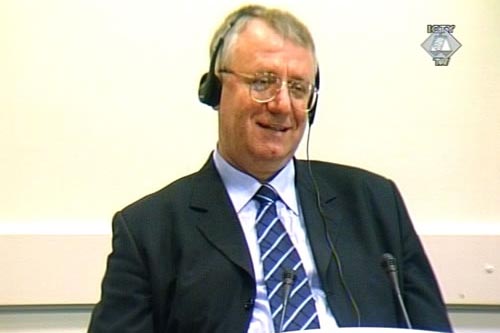Home
SESELJ, GREATER SERBIA AND HOOLBROKE'S SHOES
At the beginning of his testimony at the trial of Slobodan Milosevic, Vojislav Seselj presented his concept of Greater Serbia, explaining that the watershed in the escalation of the Kosovo crisis was marked in 1998 when Holbrooke took off his shoes before he entered the house where he met KLA representatives
 Vojislav Seselj in the courtroom
Vojislav Seselj in the courtroom Between October 1998 and June 1999, there was no joint criminal enterprise to ethnically cleanse Kosovo, because, if had there been any such enterprise, Vojislav Seselj "would definitely have known about it" as the deputy prime minister of Serbia. Seselj claimed at the beginning of his testimony as Slobodan Milosevic's defense witness that, on the contrary, at that time the Serbian authorities "were trying in every way available to find a peaceful solution for the problem of Kosovo and Metohija and to avoid the NATO aggression."
His testimony today was almost entirely devoted to those attempts. According to Seselj, they failed primarily because of the policy and plans of the Western powers, first of all of the USA. According to the leader of the Serb Radicals, the USA wanted to cause the conflict in order to use it as a pretext for sending their armed forces to Kosovo. The watershed, Seselj claims, was reached when Richard Holbrooke took off his shoes as he entered the house where he met with KLA representatives in 1998. When Judge Robinson asked what "the significance of taking off his shoes" was, Seselj replied that Holbrooke was "currying favor" with his hosts and "suggested that there was an intimate relationship" between the Americans and the KLA.
In the introductory part of his testimony, as he spoke about himself, Seselj briefly presented his concept of Greater Serbia. It is expected to be discussed at greater length in the direct and cross-examination in the days to follow. This concept, as Seselj explained today, was "the concept of a single Serb state which will include all the Serb lands and the majority of the Serb people," fostering the "brotherhood and unity of Orthodox Serbs, Catholic Serbs, Muslim Serbs, Protestant Serbs and atheist Serbs." The Serbian Radical Party, according to its founder and president, is the only political party in Serbia to advocate the concept of Greater Serbia to this day, while Milosevic's SPS always advocated keeping Yugoslavia intact.
Seselj had earlier tried to present this concept at a status conference in his case, but had been interrupted by Judge Agius who warned him not to "put his horse before the cart" and not to "say things that might be used against him". Judge Robinson issued a similar caution to the witness today, but only after the first break, after Seselj presented the concept which was, as he said, "the raison d'etre of the Serbian Radical Party."
As he presented himself, Seselj spoke at length about his scholarly and political career, his expulsion from the League of Communists, his trial and imprisonment and the "mob-style coup on 5 October 2000, when the new pro-Western government of traitors expelled him from the Belgrade Law School, where he had taught since 1999."
Except for the "government of traitors" in Serbia, Seselj condemned the Montenegrin prime minister Milo Djukanovic for surrendering "a citizen of his own country" Momcilo Mandic to Bosnia and Herzegovina, after it issued an international arrest warrant. He was wanted for commercial crimes. When Seselj said it was "outrageous that a country should extradite its own citizen”, Judge Bonomy noted it was "the usual practice in the common law countries." When the former lecturer at the Belgrade Law School expressed his disbelief, Judge Robinson promised he would "send him a list of cases for his own education", cases of the nature Seselj described as "outrageous".
Vojislav Seselj's testimony will, as it seems, take at least two weeks.
Linked Reports
- Case : Milosevic Slobodan - "Kosovo, Croatia and Bosnia"
- 2005-08-18 ANOTHER ALBANIAN AS MILOSEVIC'S DEFENCE WITNESS
- 2005-08-17 WITNESS WITH A REPUTATION
- 2005-07-21 PROSECUTION SEEKS TO REOPEN CASE
- 2005-08-22 MILOSEVIC'S WORKING HOURS WILL NOT BE EXTENDED
- 2005-08-22 SESELJ'S VIEW OF THE WORLD
- 2005-08-23 WILL MILOSEVIC BENEFIT FROM SESELJ'S TESTIMONY?
